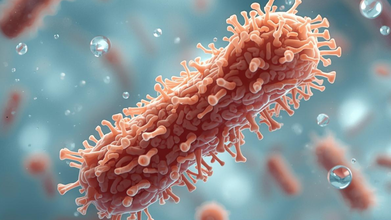- Health Conditions A-Z
- Health & Wellness
- Nutrition
- Fitness
- Health News
- Ayurveda
- Videos
- Medicine A-Z
- Parenting
World Kidney Cancer Day: ‘Overusing 'Safe’ Painkillers Are A Hidden Cause Of Kidney Cancer

Headache? Take a painkiller. Joint pain? Take another. For all of us, over-the-counter (OTC) painkillers such as ibuprofen or acetaminophen are as much a part of daily life as a morning cup of coffee. They're fast, efficient, and appear harmless—who needs a prescription, anyway? But what if this blase dependence on painkillers is actually laying the groundwork for a much more devastating health emergency?
If that's your daily mantra, don't worry, you're in good company. In the age of instant gratification, all of us are turning to over-the-counter pain relievers as a quick fix for even mild pain. But what if this ostensibly innocuous habit is silently threatening your kidneys with a major health problem?
Painkillers, or analgesics, are usually a lifeline for individuals with chronic or severe pain. From recovery from surgery and migraines to arthritis and menstrual cramps, these drugs offer relief that ensures our quality of life is not drastically reduced. But beneath the pain relief lies a surprising question: whether the overuse of these drugs may exact too high a price-kidney damage and even kidney cancer.
Dr. Aditya Punamiya, a GI, HPB, and Gynecologic Oncosurgery Consultant, cautions, "The long-term and uncontrolled use of over-the-counter painkillers is emerging as an under-diagnosed but serious risk factor for kidney cancer." Dr Punamiya observations reveal an alarming pattern, numerous patients self-medicate for chronic pains—headaches, joint pains, or back pain—unaware of the additive damage to the kidneys.
Why We Turn to Painkillers So Easily?
Pain is a biological alarm system. Helpful in warning us of injury or sickness, chronic pain can strongly interfere with our functioning on a daily basis. To counter this, painkillers provide a feeling of control and comfort. For acute on-demand pain and chronic inflammatory diseases, drugs like NSAIDs and acetaminophen are not only handy but effective as well.
Sadly, the very ease of use of these drugs has led to their misuse. Painkillers are increasingly being consumed without medical supervision, particularly in nations such as India where OTC availability is prevalent but even within well-regulated economies such as the U.S., long-term use has become an undercurrent of an epidemic.
What Are The Types of Painkillers?
Over-the-Counter (OTC) Medications
Paracetamol (Acetaminophen): Good for fever and light pain, but hepatotoxicity is a serious issue above moderate doses.
NSAIDs (Non-Steroidal Anti-Inflammatory Drugs): Contains ibuprofen, naproxen, and diclofenac. These are useful for pain that is inflammation-related but have gastrointestinal and renal toxicity with long-term use.
Prescription Painkillers
Opioids (Tramadol, Morphine, Oxycodone): For severe pain only but pose the risk of respiratory depression, addiction, and endocrine disruption.
Topical and Alternative Therapies
Topical creams and patches containing drugs such as menthol or capsaicin are localized treatments with fewer systemic hazards.
How Do these Drugs Harm the Kidneys?
How do such drugs damage the kidneys? Dr. Punamiya clarifies, "Drugs such as ibuprofen, diclofenac, and naproxen, if taken in excess, can harm the kidneys in two ways. One, they weaken the kidneys' function to filter blood by cutting off blood supply. Two, they cause chronic interstitial nephritis over time, scarring kidney tissues." This scarring provides a fertile ground for RCC to grow.
The kidneys, essential organs responsible for filtering waste products from the blood, are especially susceptible to chronic exposure to NSAIDs and acetaminophen. Acute kidney injury, chronic kidney disease, and, in severe cases, kidney failure can result from excessive use of these compounds. The transition to kidney cancer is not as sudden but equally alarming, since the cumulative insult changes cellular mechanisms, possibly initiating malignant growth.
A landmark meta-analysis by Toni K Choueiri, Youjin Je, and Eunyoung Cho has again highlighted the relationship between chronic painkiller use and renal cell carcinoma (RCC)—the leading form of kidney cancer.
Non-Aspirin NSAIDs: Chronic use was linked to a 25% enhancement in the risk of RCC. Heavy consumption increased that threat by 56%, long-term consumption for more than 10 years especially concerning for women.
Acetaminophen: Associated with a 21% heightened risk of kidney cancer. Heavy users who took high doses saw their risk rise by 66%.
Aspirin: While most U.S.-based research found no conclusive link, some research from other countries suggested a connection, possibly due to regional variation in formulation or consumption habits.
Why Kidney Cancer Is a Silent Threat?
Kidney cancer is especially stealthy since it usually presents late without any symptoms. "Flank pain, hematuria and weight loss are typically late presentations," states Dr. Punamiya. For patients such as Sarah, who might have been taking painkillers for years, these signs may only manifest by the time cancer has metastasized, and so treatment is less effective.
Risk factors such as smoking, hypertension, diabetes, and obesity increase the risk, particularly in individuals with previous long-term analgesic use. Women also have an increased risk with non-aspirin NSAIDs, possibly because of hormonal or metabolic variation, although further work is required to explain this difference. He describes two principal mechanisms:
Decreased Renal Blood Flow: NSAIDs inhibit prostaglandins, decreasing kidney blood flow and compromising kidney filtration capability.
Chronic Interstitial Nephritis: Long-term NSAID use leads to fibrosis and inflammation of kidney tissue, setting the stage for RCC.
"Most patients self-treat for headaches or joint pain without knowing they're gradually driving their kidneys towards failure," he adds.
Why Early Detection Of Kidney Cancer Symptoms is Difficult?
Kidney cancer is infamous for its asymptomatic nature in the early stages. By the time symptoms such as pain in the flank, hematuria (urine containing blood), or unexplained weight loss appear, the disease is usually advanced. Patients with pre-existing risk factors—such as smoking, hypertension, and diabetes—and with a history of analgesic abuse are particularly susceptible.
Dr. Punamiya advises individuals to consult a doctor for ongoing pain rather than resorting to self-medication. "Routine screening and preventive caution are necessary, especially for vulnerable groups," he points out.
What Are Ways You Can Manage Pain Management Smartly?
Not every use of painkillers is risky. "Short-term, doctor-monitored use is generally safe," says Dr. Punamiya. The trick is not entering into uncontrolled, long-term use. Here's how to handle pain more safely:
Consult a Healthcare Provider
For long-term pain, consult a professional to treat the underlying condition, whether arthritis, neuropathy, or migraines. A customized treatment plan can minimize painkiller dependency.
Try Non-Drug Options
Physical therapy, acupuncture, yoga, and cognitive-behavioral therapy can treat chronic pain without medication risks. For sudden pain, ice, heat, or rest may be enough.
Use Painkillers Wisely
Follow instructions on dosing and avoid prolonged use outside of medical guidance. For NSAIDs, eat food when taking to reduce stomach discomfort, and drink enough fluids to aid kidney function.
Take Precautions
Encourage regular health screening for early detection of kidney problems, particularly among high-risk groups. Dr. Punamiya urges "preventive vigilance" with follow-up visits and attention to early signs such as blood in the urine or recurrent flank pain.
Lifestyle Matters
A balanced diet, exercise, and weight control can cut pain from conditions such as arthritis while reducing kidney cancer risk factors such as obesity and high blood pressure.
There may be the temptation to cover up pain instead of comprehending its cause but swallowing a pill with a glass of water can be an instant solution that might come at a price of long-term health. The growing body of evidence linking commonly used painkillers to kidney cancer is a call for informed, cautious use. As more people take their health into their own hands, the importance of education, medical guidance, and moderation cannot be overstated.
Dr. Aditya Punamiya is a Consultant GI, HPB & Gynec Onsosurgery at HCG Cancer Centre, Borivali in India
Cutting Back on Sugary Drinks Can Improve Teen Anxiety

Credit: Canva
A new study suggests that drinking sugary drinks can increase anxiety, among other mental issues, in adolescents by 34 percent.
Sugary drinks are known to be more harmful due to their low fiber, protein, or fat, which typically slow down digestion in solid foods. This means liquid sugar gets into your bloodstream very quickly, causing a sudden jump in blood sugar and insulin levels.
Hyper-fast intake of such drinks can also make it hard for your liver to process the sugar, especially the fructose part. n large amounts, fructose turns into fat in your liver. This buildup of fat is linked to metabolic problems that lead to Type 2 diabetes.
Apart from this, a Bournemouth University, UK literature review analyzed people aged between ten and 19 who drank fizzy drinks, colas, sweetened fruit juices, sweetened milk drinks, energy drinks, and sweetened tea or coffee and found multiple links between the beverages and anxiety diagnosis.
The gut-brain axis — the connection between the brain and the gut — may help explain the link between sugary drinks and anxiety. But gut health is influenced by many factors, including diet, stress, and sleep, which are also linked to anxiety.
Overall, the study suggests that cutting back on sugary drinks could help support teenagers’ mental health. While many studies have looked at how reducing sugary drinks improves physical health, more research is needed to see if it also benefits mental health.
READ MORE: Smoking Cannabis Can Lead To Mental Illnesses In Teenagers, Study Finds
WHO Asks Countries To Tax Sugary Drinks
The World Health Organization is asking countries across the world to increase taxes on sugary drinks and alcohol to reduce cases of chronic conditions such as Type 2 diabetes, obesity, heart disease and fatty liver.
In a January 13 virtual conference, WHO Director-General Dr Tedros Adhanom Ghebreyesus said: "Health taxes have been shown to reduce consumption of these harmful products, helping to prevent disease and reduce the burden on health systems.
"At the same time, they generate an income stream that governments can use to invest in health, education and social protection."
According to a recent report on sugar-sweetened beverages taxes, at least 116 countries tax sugary drinks, including sodas or carbonated canned drinks, but other high-sugar products, such as 100 per cent fruit juices, sweetened milk drinks and ready-to-drink coffees and teas, escape taxation.
Additionally, another report on alcohol taxes shows that even though 167 countries levy taxes on liquor, wine and beer, alcohol has become more affordable or remained unchanged in price in most countries since 2022, as taxes do not get adjusted for inflation and income growth.
How To Cut Back On Sugary Drinks?
Sugary drinks can feel addictive. If you find yourself hooked, try to slowly reduce how much you drink, just like you would with alcohol or tobacco. It helps to plan ahead for when you usually crave a soda.
You can start by mixing plain sparkling water with an equal amount of fruit juice or soda. Then, week by week, slowly reduce the amount of the sugary drink until you're mostly just drinking sparkling water. If it helps, add a little lemon or lime juice for flavor.
Running Ultra-Marathons Harms Your Red Blood Cells, Study Says

Credit: Canva
Participating in ultra-marathons can cause damage to your red blood cells' flexibility and hamper their oxygen-carrying capacity, a study suggests.
A study published in the American Society of Hematology’s journal Blood Red Cells & Iron notes that extreme forms of exercise may harm, rather than support, overall health.
In the case of ultra-marathons, runners experience breakdown of normal red blood cells during races. Over time, their red blood cells become less flexible and potentially reduce their ability to efficiently carry oxygen, nutrients and waste products throughout the body.
Travis Nemkov, associate professor in the department of biochemistry and molecular genetics at the University of Colorado Anschutz and the study’s lead author said of the results: “Participating in events like these can cause general inflammation in the body and damage red blood cells.
“Based on these data, we don’t have guidance as to whether people should or should not participate in these types of events; what we can say is, when they do, that persistent stress is damaging the most abundant cell in the body.”
Red blood cells transport oxygen and waste throughout the body and must be flexible enough to squeeze through small blood vessels. When red blood cells become inflexible or rigid, they lose their ability to deform and navigate through the body's smallest vessels, leading to impaired oxygen delivery, blockage of blood flow, and rapid destruction by the body's filtration system.
This can lead to low hemoglobin and anemia which can pave the way for diseases like Sickle Cell Disease (SCD), thalassemia, hereditary spherocytosis, and, in some cases, the "storage lesion" of blood in transfusion banks.
READ MORE: Ultra Marathoner Sufiya Sufi Runner: The Woman Who Set 5 Guinness World Records
What Is Low Hemoglobin?
Hemoglobin is the oxygen-carrying protein in red blood cells. Adequate hemoglobin levels are essential for keeping organs and tissues properly supplied with oxygen. Without enough of it, the body begins to struggle to meet its basic energy needs.
Low hemoglobin is usually identified through a blood test. It is most often measured as part of a complete blood count (CBC), which checks different components of the blood, including red and white blood cells and platelets, as per Healthline.
While exact reference ranges can vary slightly between laboratories, healthy adult hemoglobin levels usually fall within the ranges listed below. These values are different for babies, children, and teenagers:
- Normal Hemoglobin Count in Grams per Deciliter (g/dL) | Normal Hemoglobin Count in Grams per Liter (g/L)
- Adult Males: 13.8–17.2 | 138–172
- Adult Females: 12.1–15.1 | 121–151
Any reading below these ranges in adults is considered low hemoglobin and suggests that oxygen delivery in the body may be reduced, as per Mayo Clinic.
Is Low Hemoglobin Ever Dangerous?
Low hemoglobin is not always an emergency. In many cases, it develops gradually and can be managed with treatment. That said, very low levels can be dangerous. A hemoglobin level below 5.0 g/dL has been linked to serious complications, including heart failure and even death. Levels under 6.5 g/dL may be considered life-threatening and require urgent medical care.
What Causes Low Hemoglobin?
One of the most common reasons for low hemoglobin is anemia. Anemia occurs when the body does not have enough healthy red blood cells. The most frequent type is iron-deficiency anemia, which develops when the body lacks enough iron to produce hemoglobin.
Other forms of anemia include pernicious anemia, which occurs when the body cannot properly absorb vitamin B12, and hemolytic anemia, where red blood cells are destroyed faster than they are produced.
Low hemoglobin can also be caused by:
- Blood loss or internal bleeding
- Certain cancers, including leukemia, lymphoma, multiple myeloma, and cancers that spread to the bone marrow
- Chronic kidney disease
- Deficiencies of folate or vitamin B12
- Hypothyroidism
- Liver disease
- Poor nutrition or malnutrition
- Myelodysplastic syndrome (MDS)
- Sarcoidosis
- Sickle cell disease and other inherited blood disorders
- Systemic lupus erythematosus
- Thalassemia, a genetic condition that reduces hemoglobin production
- Excess fluid in the body
- Cancer treatments such as chemotherapy and radiation can also lower hemoglobin levels, particularly in adults over the age of 65.
What Does Having Low Hemoglobin Feel Like?
Some people with mildly low hemoglobin may not notice any symptoms at first. Others may begin to feel unwell as levels drop further or remain low over time. Common signs and symptoms include:- Feeling dizzy or lightheaded, sometimes fainting
- Muscle weakness
- Ongoing fatigue or low energy
- Pale or washed-out skin
- Frequent headaches
How Is Low Hemoglobin Treated?
Treatment depends entirely on what is causing the low hemoglobin. A healthcare provider will first identify the underlying reason before recommending treatment. Possible treatment options include:
- Blood transfusion: If hemoglobin is low due to heavy blood loss, a transfusion may be needed to restore levels quickly.
- Vitamin supplements: When nutritional deficiencies are the cause, iron, folate, or vitamin B12 supplements are often prescribed. Hemoglobin levels usually begin to improve within six to eight weeks.
- Intravenous (IV) therapy: In cases where iron or B12 levels need to be raised rapidly, IV infusions may be recommended.
- Bone marrow transplant: This may be required when low hemoglobin is linked to certain cancers or bone marrow disorders.
If a long-term illness is responsible, managing that condition becomes the key part of treatment, alongside monitoring hemoglobin levels regularly.
Danish Study Links Hidden Bacteria In The Gut To Colorectal Cancer

Researchers from Denmark and Australia have discovered a new virus in the gut that can contribute to the development of colorectal cancer in the body, one of the leading causes of death in the world.
Using genetic sequencing, researchers studied the gut bacteria of cancer patients in a large Danish study and found that Bacteroides fragilis, an anaerobic, gram-negative, pleomorphic to rod-shaped bacterium, often carried a bacteriophage — a virus that infects and reproduces inside bacteria.
This allows it to produce a toxin (BFT) in the colon, promoting chronic inflammation, cell proliferation and tumor growth in the region.
People with colorectal cancer were twice as likely to have this bacteriophage in their gut bacteria. The virus also appears to be previously unknown and does not match any recorded type so far.
Although the first finding came from a small group, it was later confirmed in a larger study of 877 people with and without colorectal cancer. The results suggest that viruses hiding inside B. fragilis may play a role in cancer development.
Microbiologist Flemming Damgaard, from Odense University Hospital in Denmark: "It has been a paradox that we repeatedly find the same bacterium in connection with colorectal cancer, while at the same time it is a completely normal part of the gut in healthy people.
"We have discovered a virus that has not previously been described and which appears to be closely linked to the bacteria we find in patients with colorectal cancer."
What Is Colon Cancer?
Colon cancer develops from polyps in the colon or rectum, often taking years to show symptoms. The cancer begins when small growths called polyps form on the inner lining of the colon or rectum. Over time, changes in the DNA of these cells can cause the polyps to become cancerous.
As abnormal cells multiply, they replace healthy cells and eventually form a mass known as a tumor. This process develops slowly, often taking up to ten years for a precancerous polyp to turn into cancer and begin showing symptoms.
The American Cancer Society notes that colorectal cancer impacts around 1.9 million people every year.. In India, it is the fourth most common cancer among both men and women. In 2022, there were 64,863 new cases and 38,367 deaths.
Projections suggest that incidence will continue to rise by 2026, reflecting both lifestyle changes and improved detection.
Colon cancer can be difficult to detect because it often develops without obvious symptoms. According to experts , these are the three things you should do to protect yourself:
1. Timely risk screening
2. Knowing your cancer family history
3. Acting on early symptoms
What Early Symptoms Should You Look Out For?
Colon cancer rarely announces its presence with dramatic symptoms. More often, it whispers — through changes in bowel habits, subtle abdominal discomfort, or unexplained weight loss.
Some of the most commonly missed early signs include:
- Persistent changes in bowel movements: Chronic constipation or diarrhea often dismissed as dietary effects.
- Blood in stool: Bright red or dark blood should not be ignored.
- Unexplained weight loss: Especially when unintentional.
- Abdominal cramps or bloating: Misinterpreted as common digestive issues.
Persistent changes in bowel habits, especially if they last more than a few days, must be taken seriously. Narrow or ribbon-shaped stools may indicate a tumor partially blocking the colon.
© 2024 Bennett, Coleman & Company Limited

